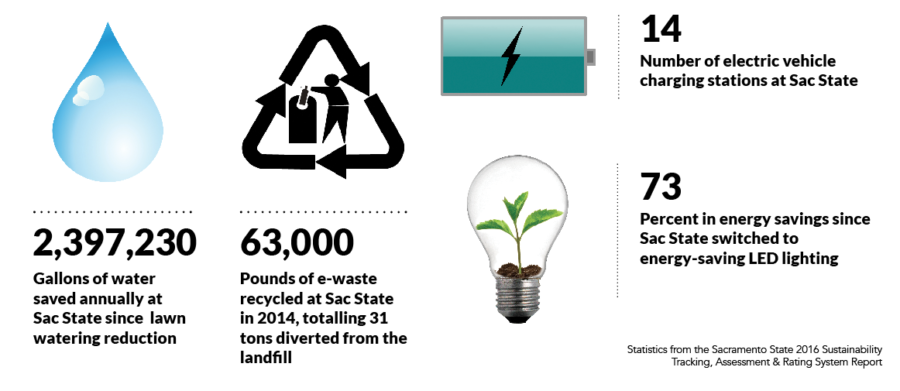Sacramento State has further bolstered its reputation as a leader in sustainability after being named to the Princeton Review’s 2017 Green College Honor Roll, the only CSU to be included.
Sac State was one of 21 schools nationwide to make the prestigious list. Four other California schools — UC Irvine, UC Santa Cruz, Santa Clara University and Stanford — were also named.
“It’s kind of cool to be the only CSU on there,” Sac State sustainability manager Ryan Todd said. “We’re right up there with some of the UCs with some of the things we’re doing.”
“It says a lot about our sustainability program for this campus that we can compete with private schools and UCs,” Todd said.
The Green College Honor Roll rates colleges on a scale of 60-99, measuring three key criteria: “whether students have a campus quality of life that is both healthy and sustainable, how well a school is preparing students for employment in the clean-energy economy … and how environmentally responsible a school’s policies are,” according to the Princeton Review’s website.
Sacramento State received a score of 99 — the highest possible score.
Sac State recycling manager Joey Martinez, who has worked on campus sustainability since 2012, said that the award is a recognition of Sac State’s recent push to stand at the forefront of sustainability.
“It says a lot about the culture of the campus. They’re making this a priority — they want to invest efforts into this,” Martinez said.
Projects including on-campus composting receptacles, LED light retrofitting, the installation of bioretention planters and utilizing natural gas created from food waste to power the campus’ shuttle service are just a few of the major overhauls to take place within the past few years.
The Green College Honor Roll announcement comes after Sac State was given a Gold rating by the Association for the Advancement of Sustainability in Higher Education in July.
The AASHE rating program, the Sustainability Tracking, Assessment and Rating System, or STARS, relies on self-reported information and tracks over 750 colleges worldwide.
“It’s a massive rating system,” Todd said of STARS. “We went through the entire campus and looked through every single aspect of sustainability. This report came to 270 pages. It looks at everything from the curriculum being taught — are their professors teaching this stuff? — to your waste diversion rates, to the types of buildings you’re building.”
Todd attributes much of Sac State’s recent sustainability success to the support of President Nelsen and Sac State students, referring to them as the “two pieces of the puzzle.”
In April, Nelsen celebrated Earth Day at Sac State by signing Second Nature’s Climate Leadership Carbon Commitment — a pledge to effectively reduce greenhouse gas emissions to a net zero by a specified target date.
“Universities have a moral obligation not only to educate students and advance knowledge, but also to create a better world,” Nelsen said at the signing.
As Martinez notes, however, the three aren’t mutually exclusive.
“The great thing about [sustainability on campus] is that it doesn’t just mean that Sac State becomes more sustainable, because what we do trickles out into the surrounding community,” Martinez said.
“Sacramento by extension becomes more sustainable, our region becomes more sustainable, because all the people that are trained here throughout their education are going to take those priorities and take them with them wherever they go,” Martinez said.
































































































































